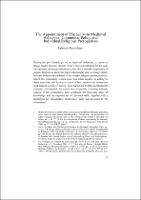Please use this identifier to cite or link to this item:
https://hdl.handle.net/20.500.12202/8534| Title: | The Appointment of Hazzanim in Medieval Ashkenaz: Communal Policy and Individual Religious Prerogatives |
| Authors: | Kanarfogel, Ephraim Kreisel, Howard Huss, Boaz Ehrlich, Uri Stern, Max 0000-0002-7539-7802 |
| Keywords: | Hazzanim Medieval Ashkenaz |
| Issue Date: | 2009 |
| Publisher: | Beer-Sheva : Ben-Gurion University of the Negev Press |
| Citation: | Kanarfogel, E. (2009). The Appointment of Hazzanim in Medieval Ashkenaz: Communal Policy and Individual Religious Prerogatives. In. Howard Kreisel, et al. (eds), "Spiritual authority : struggles over cultural power in Jewish thought" (pp. 5-31). Beer-Sheva : Ben-Gurion University of the Negev Press. |
| Abstract: | During the pre-Crusade period in medieval Ashkenaz, a cantor or prayer leader (hazzan, shaliah tsibbur)1 was considered to be not only an important communal functionary, but also a veritable respository of prayer. The hazzan knew the prayers thoroughly and, to a large extent, by heart; he knew the traditions of the complex religious poems, piyyutim, which the community recited (and was often capable of adding to those piyyutim); and he was a source of law, practice and instruction with respect to prayer.2 Indeed, even during the twelfth and thirteenth centuries and beyond, the cantor was frequently a leading rabbinic scholar of the community, who combined the necessary areas of knowledge and the requisite set of cantorial skills, together with a reputation for unassailable observance, piety and devotion to the community.3 |
| Description: | Scholarly book chapter |
| URI: | https://hdl.handle.net/20.500.12202/8534 |
| ISBN: | 9789655360042 |
| Appears in Collections: | Bernard Revel Graduate School of Jewish Studies (BRGS): Faculty Publications |
Files in This Item:
| File | Description | Size | Format | |
|---|---|---|---|---|
| Ephraim_Kanarfogel_The_Appointment_of_Hazzanim 5-31.pdf | 235.79 kB | Adobe PDF |  View/Open |
This item is licensed under a Creative Commons License

